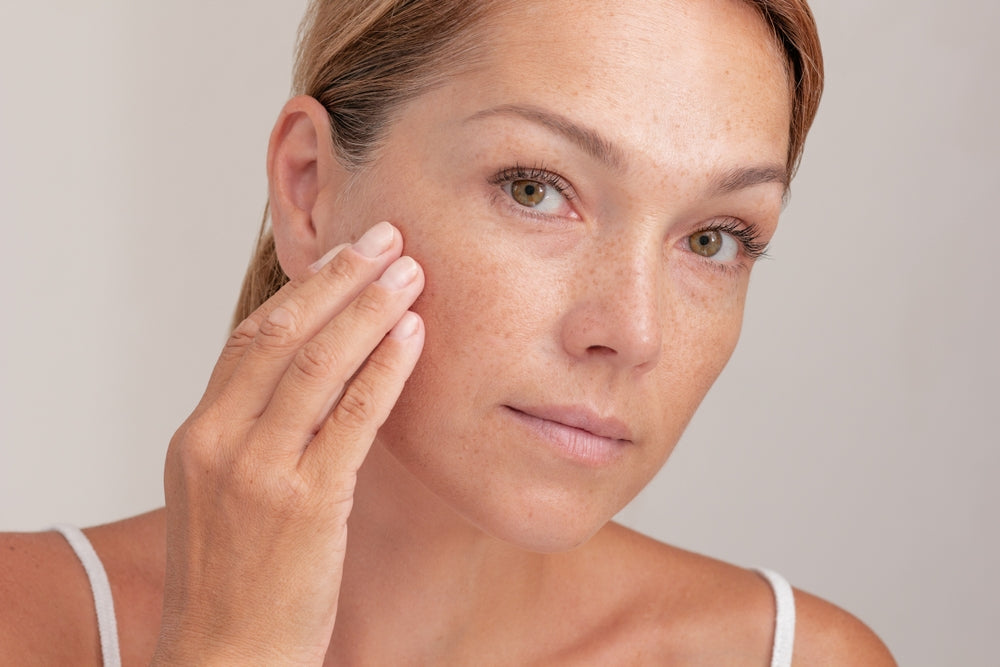Depending on where you hear about the latest in skincare trends, you may have noticed that tinted sunscreens are becoming more and more popular each year. While you may know they provide an extra layer of “glow” or help even your skin tone when enjoying a day in the sun, there’s actually more going on beneath the surface (so to speak) that sets a tinted formula apart from its non-tinted sunscreen counterparts.
Let’s learn what makes tinted sunscreen different and whether you should be using it regularly.
Why Use Sunscreen In The First Place?
Before we talk about sunscreen, we should establish why we need it. The short answer is that the sun damages the skin and can cause painful sunburns or even skin cancer over time without protection. The longer answer helps clarify the difference between types of sunscreens and cosmetic products that claim to have SPF.
There are two types of light that can harm your skin: UVA rays penetrate deeper into the skin causing a breakdown of important structures such as collagen and elastin leading to wrinkles, pigmentation, and dehydration. UVB rays are closer to the surface of the skin causing it to burn. Broad-spectrum sunscreen can help to protect the skin against both types of UV light.
Visible light can also harm skin, particularly toward the blue end of the spectrum. Different wavelengths of light are used to treat certain skin conditions due to how they’re absorbed by different structures. Blue light, increasingly encountered in our daily lives through device screens of all types, has been shown to stimulate pigment production, leading to issues like hyperpigmentation.
Daily sun protection is necessary to protect the long-term look and health of our skin. Whether you wear tinted SPF to protect your skin from harmful UV rays, cover dark spots, or wish to keep your skin smooth, we offer the perfect tinted sunscreen for your needs.
What is Tinted Sunscreen?
Tinted sunscreen refers to a mineral-based, broad-spectrum sunscreen that contains a blend of added pigments to add a sheer tint, matching your sunscreen to whatever skin tone color you naturally have. Common minerals used in these types of sunscreen include zinc oxide and titanium dioxide. Iron oxides are effective at blocking blue light and both types of UV rays.
Tinted mineral sunscreens differ from other effective mineral-based sunscreens that leave a characteristic white cast or streak on the skin – think of the iconic stripe of white on lifeguards’ noses. In this case, the main benefit of a tinted SPF is that it helps you look more natural while still providing effective sun protection.
Tinted mineral sunscreens also offer an appropriate amount of sun protection in comparison to makeup with sunscreen in it. The amount of sunscreen in makeup is not enough to protect your skin because it would be necessary to use far more product than is reasonable to be effective.
What is Un-Tinted Sunscreen?
Non-tinted sunscreen can come in a variety of types of formulas. They can even be thought to include makeup and cosmetic products like lip balm that include SPF (sun protection factor). A good mineral-based zinc oxide sunscreen can be un-tinted. The best sunscreen is the one you will wear! Apply daily and reapply often, especially if you are sweating or swimming.
How To Use Tinted Sunscreen
Tinted sunscreens blend the line between skincare product and makeup a little bit, since they’re designed to help mask the appearance of the active ingredients with additional pigment. Before applying sunscreen, it’s probably a good idea to cleanse and moisturize your face, so the sunscreen goes on smoothly.
Use a small amount at first, applying it across your face with a special focus on points like the forehead, nose, and other prominent areas. Smooth it outward until it is blended out l and your entire face is covered. If you feel you didn’t reach every area, layer a smaller amount on top until you have good coverage all over.
Wait for the sunscreen to dry before applying makeup.
High-Quality Tinted Sunscreen By Epicuren Discovery
At Epicuren, we understand the importance of maintaining vibrant-looking skin. Our variety sunscreens are formulated with broad-spectrum ingredients and gentle tints to give your skin the beach day glow you’re looking for while delivering UV protection. Discover more products by browsing our complete collection or by taking our Skin Quiz today.





